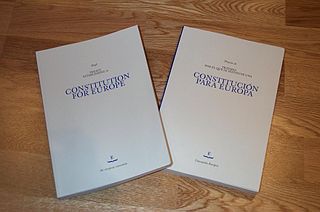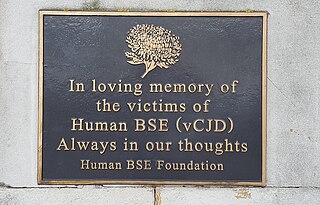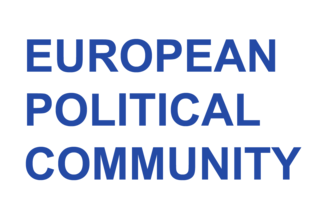| |||||
| Decades: | |||||
|---|---|---|---|---|---|
| See also: | |||||
Events from the year 1996 in the European Union .
| |||||
| Decades: | |||||
|---|---|---|---|---|---|
| See also: | |||||
Events from the year 1996 in the European Union .
The European Capital of Culture is a city designated by the European Union for a period of one calendar year, during which it organises a series of cultural events with a strong European dimension.

The Council of the European Union, often referred to in the treaties and other official documents simply as the Council, and informally known as the Council of Ministers, is the third of the seven Institutions of the European Union (EU) as listed in the Treaty on European Union. It is one of two legislative bodies and together with the European Parliament serves to amend and approve or veto the proposals of the European Commission, which holds the right of initiative.

The European Economic Community (EEC) was a regional organisation created by the Treaty of Rome of 1957, aiming to foster economic integration among its member states. It was subsequently renamed the European Community (EC) upon becoming integrated into the first pillar of the newly formed European Union in 1993. In the popular language, however, the singular European Community was sometimes inaccurately used in the wider sense of the plural European Communities, in spite of the latter designation covering all the three constituent entities of the first pillar.

The European Council is a collegiate body that defines the overall political direction and priorities of the European Union. The European Council is part of the executive of the European Union (EU), beside the European Commission. It is composed of the heads of state or government of the EU member states, the President of the European Council, and the President of the European Commission. The High Representative of the Union for Foreign Affairs and Security Policy also takes part in its meetings.

The Treaty of Nice was signed by European leaders on 26 February 2001 and came into force on 1 February 2003.

In the politics of the European Union, an Intergovernmental Conference (IGC) is the formal procedure for negotiating amendments to the EU's founding treaties. Under the treaties, an IGC is called into being by the European Council, and is composed of representatives of the member states, with the Commission, and to a lesser degree the Parliament also participating.

The Treaty establishing a Constitution for Europe was an unratified international treaty intended to create a consolidated constitution for the European Union (EU). It would have replaced the existing European Union treaties with a single text, given legal force to the Charter of Fundamental Rights, and expanded qualified majority voting into policy areas which had previously been decided by unanimity among member states.

The Treaty of Amsterdam, officially the Treaty of Amsterdam amending the Treaty on European Union, the Treaties establishing the European Communities and certain related acts, was signed on 2 October 1997, and entered into force on 1 May 1999; it made substantial changes to the Treaty of Maastricht, which had been signed in 1992.
European integration is the process of industrial, economic, political, legal, social, and cultural integration of states wholly or partially in Europe or nearby. European integration has primarily come about through the European Union and its policies.
A sherpa is the personal representative of a head of state or head of government who prepares an international summit, such as the annual G7 and G20 summits. Between the G7 summits there are multiple sherpa conferences where possible agreements are laid out. This reduces the amount of time and resources required at the negotiations of the heads of state at the final summit. The name sherpa—without further context—refers to sherpas for the G7 summit, but the designation can be extended to different regular conferences where the participation of the head of state is required. The sherpa is generally quite influential, although they do not have the authority to make a final decision about any given agreement.

The General Secretariat of the Council of the European Union, also known as Council Secretariat, assists the Council of the European Union, the Presidency of the Council of the European Union, the European Council and the President of the European Council. The General Secretariat is headed by the Secretary-General of the Council of the European Union. The Secretariat is divided into seven directorates-general, each administered by a director-general.

In general, the law of the European Union is valid in all of the twenty-seven European Union member states. However, occasionally member states negotiate certain opt-outs from legislation or treaties of the European Union, meaning they do not have to participate in certain policy areas. Currently, three states have such opt-outs: Denmark, Ireland and Poland. The United Kingdom had four opt-outs before leaving the Union.
Events in the year 1994 in the European Union.

The history of the European Union between 1993 and 2004 was the period between its creation and the 2004 enlargement. The European Union was created at the dawn of the post–Cold War era and saw a series of successive treaties laying the ground for the euro, foreign policy and future enlargement. Three new member states joined the previous twelve in this period and the European Economic Area extended the reach of the EU's markets to three more.

In the European Union (EU), enhanced cooperation is a procedure where a minimum of nine EU member states are allowed to establish advanced integration or cooperation in an area within EU structures but without the other members being involved. As of October 2017, this procedure is being used in the fields of the Schengen acquis, divorce law, patents, property regimes of international couples, and European Public Prosecutor and is approved for the field of a financial transaction tax.

Bovine spongiform encephalopathy (BSE), is an incurable and invariably fatal neurodegenerative disease of cattle. Symptoms include abnormal behavior, trouble walking, and weight loss. Later in the course of the disease the cow becomes unable to function normally. There is conflicting information about the time between infection and onset of symptoms. In 2002, the WHO suggested it to be approximately four to five years. Time from onset of symptoms to death is generally weeks to months. Spread to humans is believed to result in variant Creutzfeldt–Jakob disease (vCJD). As of 2018, a total of 231 cases of vCJD had been reported globally.
Events in the year 1995 in the European Union.

The Treaty of Lisbon is an international agreement that amends the two treaties which form the constitutional basis of the European Union (EU). The Treaty of Lisbon, which was signed by the EU member states on 13 December 2007, entered into force on 1 December 2009. It amends the Maastricht Treaty (1992), known in updated form as the Treaty on European Union (2007) or TEU, as well as the Treaty of Rome (1957), known in updated form as the Treaty on the Functioning of the European Union (2007) or TFEU. It also amends the attached treaty protocols as well as the Treaty establishing the European Atomic Energy Community (EURATOM).
Events in the year 1993 in the European Union.

The United Kingdom was afflicted with an outbreak of Bovine spongiform encephalopathy, and its human equivalent variant Creutzfeldt–Jakob disease (vCJD), in the 1980s and 1990s. Over four million head of cattle were slaughtered in an effort to contain the outbreak, and 178 people died after contracting vCJD through eating infected beef. A political and public health crisis resulted, and British beef was banned from export to numerous countries around the world, with some bans remaining in place until as late as 2019.

The European Political Community (EPC) is an intergovernmental forum for political and strategic discussions about the future of Europe, established in 2022 after the Russian invasion of Ukraine. The group first met in October 2022 in Prague, with participants from 44 European countries, as well as the Presidents of the European Council and the European Commission.